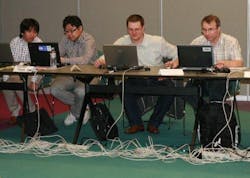OPC Workshop Validates 39 Products for Interoperability
Register today for the IOP workshops to be held in Asia (June 2012) and Europe (October 2012).
On March 23, the OPC Foundation successfully concluded its week-long, annual North American Interoperability (IOP) workshop, which was attended by 30 participants from 15 companies, with 39 products registered for testing. The OPC Foundation proudly acknowledges Invensys, in Lake Forest, Calif., for hosting this important event.
Facilitating the IOP was Nathan Pocock, the OPC Foundation Director of Certification and Compliance, who noted, “For more than ten years vendors have relied on IOP workshops to validate that their Clients and Servers are compliant to the specifications and correctly interoperate with other vendors’ products. The IOP is also a great place to learn from OPC experts, many of whom have attended regularly over these past ten years.”
The benefits of the IOP
The IOP is a specialized workshop that is specifically designed for testing interoperability between OPC Client and Server applications. This event takes place in a large room where a complete test-environment is created. Each vendor will connect to the network and then begin their testing.
The testing that occurs at an IOP workshop is based on a structured set of tests that are defined within a test database. All test results are fed-back into the same test database. This structured approach provides each vendor with a consistent list of tests to conduct, and also provides the list of products that are available around the room for testing.
There are several important benefits to attending the IOP workshop, such as the availability of products to test against, and the caliber and knowledge of the individuals in attendance. The diversity of products and platforms (Windows, Linux and embedded) provides a rich environment for true interoperability testing. As is traditional at all IOP workshops, programmers will typically find issues that they can resolve immediately.
Engineers came from around the world to attend this workshop. The focus for this year’s event was the testing of OPC UA-based products. The workshop represented a milestone, where the number of OPC UA products available for testing out-numbered the OPC Classic-based products.
The path to OPC Certification
The IOP workshop is a great resource for preparing a product for OPC Certification testing. When a product is certified by the OPC Foundation it is because the product has been rigorously tested in an independent Certification Test Lab for compliance, interoperability, robustness and recovery, usability, and resource efficiency (load-testing over 36-hours).
There are two more IOP workshops scheduled for 2012, one each in Asia and Europe, that will follow a similar format to the North American IOP event. The Asia event will be held in Tokyo, Japan, on June 20 -23. Click here for more information and to register. A Europe IOP workshop will be held in Nuremberg, Germany, on Oct. 23-26. Click here for more information and to register.

